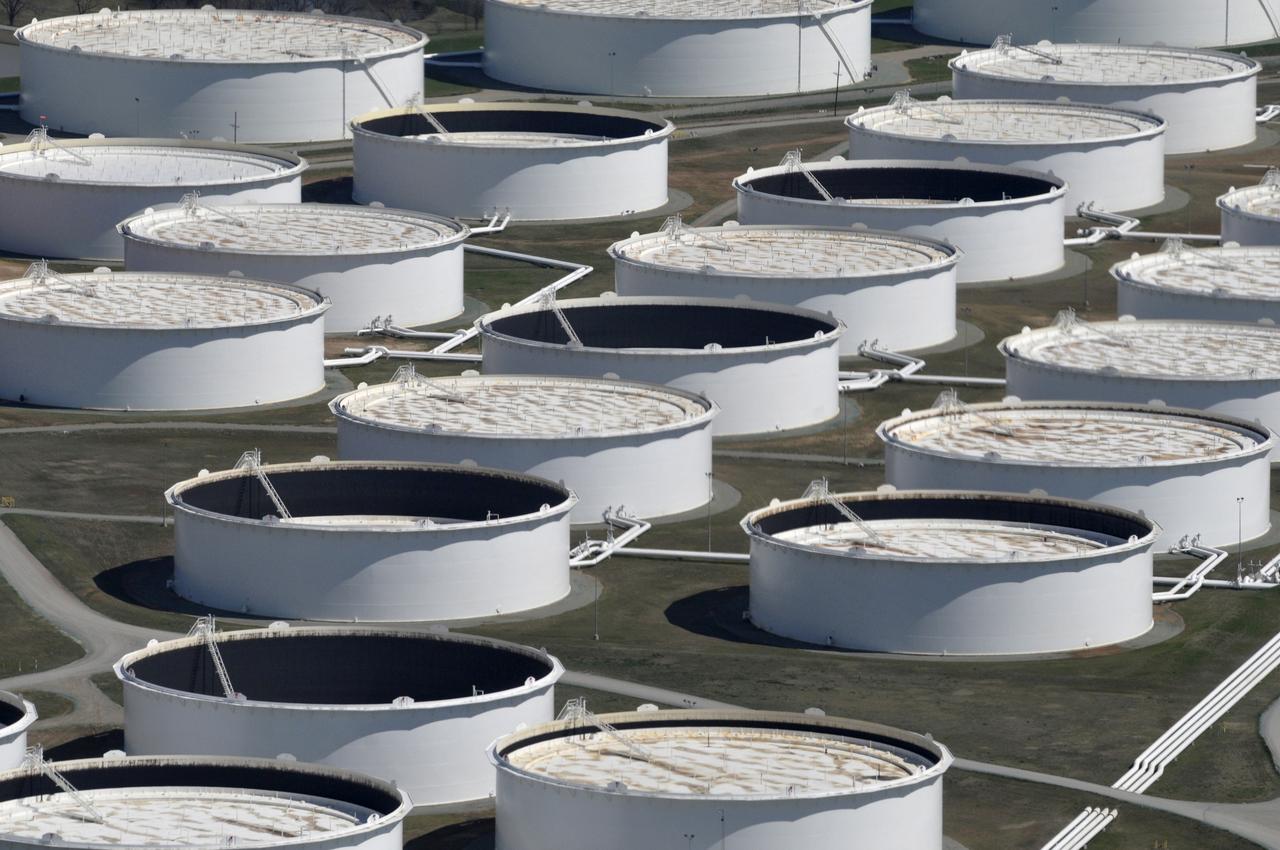NEW YORK/HOUSTON – The telephone lines have been ringing at Adler Tank Rentals in Texas as oil companies found a new use for steel tanks that had been left idle when shale producers stopped drilling – they want to use the tanks to store some of an oil glut that has overwhelmed the market and flipped U.S. crude prices negative for the first time.

Hundreds of millions of barrels of crude have gushed into storage worldwide in the past two months as the coronavirus-related lockdowns wiped out around a third of global oil demand.
With oil depots that normally store crude oil onshore filling to the brim and supertankers mostly taken, energy companies are desperate for more space. The alternative is to pay buyers to take their U.S. crude after futures plummeted to a negative $37 a barrel on Monday.
A topsy-turvy market that has oil prices for October delivery at $31 a barrel has oil firms anxious to sock away millions of barrels now to sell at a profit later.
TANK FARMS ARE FULL
In Cushing, Oklahoma, home to dozens of large tank farms with combined space for about 76 million barrels, operators are fully booked, said traders. Storage there jumped by 5.7 million barrels the week before last, according to the latest U.S. Energy Information Administration (EIA).
While the government estimated there is available space, traders said Monday’s market drop indicated any unfilled tanks are under lease, and not available to new renters.
“The industry is really scrambling to source viable storage options,” said Stuart Porter, a manager at Adler Tank Rentals (MGRC.O) in Texas, which has shale companies lining up to potentially lease dozens of its 500-barrel steel frac tanks. The tanks can be lined up like dominos and filled at the well site by producers without a home for their oil.Converge Midstream LLC with millions of barrels of storage available in underground salt caverns outside Houston has gone from few takers to requiring one- to two-year contracts.
“Quite honestly we were struggling for business. Now that the market has changed, everyone is our friend,” said Dana Grams, chief executive of Converge Midstream.
The hunt for storage points to the magnitude of the collapse in demand for U.S. shale and the huge volume of unsold oil to refiners who are cutting purchases.
Last month, the Organization of the Petroleum Exporting Countries (OPEC) and other producers including Russia threw in the towel on four years of self-imposed output curbs that gave U.S. shale a price umbrella. The result was a drop in U.S. oil prices to about $20 a barrel as Saudi Arabia and Russia pledged to pump full bore.
For a time, it looked like prices would stabilize after the pair and other nations this month agreed to deepen cuts. But crude stocks in the United States rose by 19 million barrels overall the week before last, the EIA said, the biggest one-week increase in history, setting the stage for Monday’s historic decline.
FLOATING STORAGE
In addition to the onshore glut, there are about 160 million barrels of oil sitting on tankers waiting for buyers. And at least six crude tankers carrying 2 million barrels apiece are en route to the United States from Saudi Arabia, adding to the alarm at the U.S. Gulf Coast.
It is not just crude looking for a place to go. State lockdowns have decimated demand for motor fuel. U.S. gasoline demand fell 32% earlier this month compared with the same time a year ago, the EIA said.
That glut is creating opportunities for some.
At Caliche Development Partners, which stores natural gas liquids in underground caverns near Houston, CEO Dave Marchese may shift his plans and open a newly completed 3-million-barrel underground salt-cavern for crude oil or gasoline.
“Gasoline has a pretty large contango right now,” he said, referring to prices five or more months ahead that are higher than current levels. But both fuels would require new pumps in its salt cavern, Marchese said, and he wants buyers to pay up for any upgrades.
Shale producer Teal Natural Resources had one of its three crude buyers cancel a purchase agreement last month, sending it shopping for frac tanks. They are not cheap, Teal CEO John Roby learned after scouring the market.
Storing a month’s worth of output would cost Teal about $20 a day per tank, or about $300,000 a month. At those rates, Teal would rather shut in wells, he said.
Shutting off wells is not for everyone, though, because it can reduce future oil recovery, and may put a producer in breach of their lease contracts.
Rentals for frac tanks have jumped from about $15 a day previously, a Texas oil marketer said.
Another oil producer, Texland Petroleum aims to sell immediately whatever crude it can this month, said President Jim Wilkes. He is considering adding frac tanks to avoid having to pay to have his oil carried away in May.
Joshua Wade, an oil marketer in Oklahoma, is in talks to reserve about 100,000 barrels of storage for May using a combination of frac tanks, on-system pipeline storage and smaller tanks that have been dormant on pipelines.
But time is running out and costs are rising quickly.
“A lot of people have been calling me now and saying ‘I wanna go out and buy 100,000 barrels in May and put them in a frac tank,’” said Wade. “I tell them the party started about a month ago and it’s now almost over.”
[contextly_sidebar id=”I8xkVFs7KUP7OguSRVe3q9oT2Qdmu11t”]







